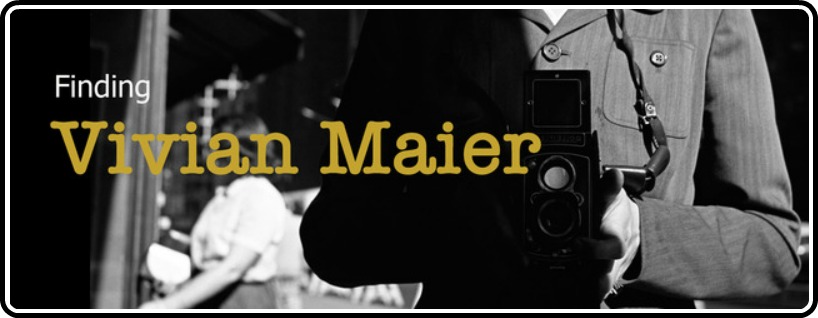With everything from photography, to filmmaking, all the way to criticism becoming as culturally democratized as each of those things have ever been at any point in human history, a new documentary takes a look at just what type of discovery we may expect to hear much more about as the generations begin to pass.
The art of “street photography” is a tricky one to master. Constantly pointing and shooting with the hopes of hitting your shot with about the same frequency as a serviceable baseball professional nails a pitch, most street photographers rely on massive quantities of pictures taken, thousands of rolls of footage, to get just a handful of shots simply worthy of saving, let alone trying to earn any profit from. However, with this type of art comes the possibility for even the most mundane person becoming the most influential and important voice that the medium has ever seen.
And such is the story of Vivian Maier. A French-American nanny turned one of the 20th Century’s most important American photographers, all with the help of a man separated by decades from the moments in time that became her canvas. In 2007, a man named John Maloof purchased, for $380, an unmarked box of roughly 40,000 negatives in Chicago from the woman. Without any knowledge as to who this woman was or the quality of the photographs, he took a shot on the load of film stock, and fell upon a treasure trove of American history. Over the next few years, he spent roughly $70,000 on most of her remaining canon, and has since began learning more about the woman, and also touring her photographs whenever possible. And now, there’s this, a new documentary.
Teaming up with director Charlie Siskel, Maloof has gone the extra mile, giving us cinematic insight into this woman, those people still around able to speak to the life she lived, and those artists whose lives were forever changed by the discovery of this woman’s art. Blending interview footage with a cavalcade of photos from the woman’s catalog, the film paints a portrait of a woman who was as far from your typical art goddess as one could imagine. A nanny turned icon, Maier’s life is a breathtaking one that makes for a thrilling new look at how the greatest of art is within anyone.
Aesthetically, this film is a relatively standard picture. Ostensibly a talking head documentary, there isn’t much ground breaking being done here. The photos here are so bloody beautiful that you find yourself wanting to have stacks of coffee table books about this woman’s work, but it is otherwise a documentary that becomes a better faux-mystery tale than a real bit of form-pushing documentary cinema. A wondrously paced picture, the film never slows down for a moment, always giving the viewer a new, deeper, glimpse into the life and times of this underrated art legend, and how uncanny her rise to fame truly is. In a world where are has become democratized with the rise of smartphones, the internet and Kickstarter, this is one of the purest examples of how that democratization can truly make something beautiful, given the right person getting the right instrument.
The portrait of Maier here is an interesting one. A woman of intense privacy, Maier was a devout social introvert, who just so happened to make some of the greatest pieces of street art of her generation. Taking on an artform in street photography that forced her to be the extrovert that she never truly could embrace, even the style of camera she used allowed her to hide, in her own way, her photography, a passion of hers that most people in her life didn’t know was as strong as it truly was.
Overall, while the film itself isn’t an aesthetic wonder like much of its recent documentary brethren, this is a top tier mystery tale that shines a light on an artist that never gets the due she so rightly deserves. A beautiful look at an artist’s life and the growing democratization of art, this is a superb documentary that is both insightful and beautifully entertaining and enthralling.




![Bergman Island (The Criterion Collection) [Blu-ray]](https://criterioncast.com/wp-content/uploads/2022/11/bergman-island-the-criterion-collection-blu-ray-400x496.jpg)
![This Is Not a Burial, It’s a Resurrection (The Criterion Collection) [Blu-ray]](https://criterioncast.com/wp-content/uploads/2022/11/this-is-not-a-burial-its-a-resurrection-the-criterion-collection-blu-ray-400x496.jpg)
![Lars von Trier's Europe Trilogy (The Criterion Collection) [The Element of Crime/Epidemic/Europa] [Blu-ray]](https://criterioncast.com/wp-content/uploads/2022/11/lars-von-triers-europe-trilogy-the-criterion-collection-the-element-of-400x496.jpg)
![Imitation of Life (The Criterion Collection) [Blu-ray]](https://criterioncast.com/wp-content/uploads/2022/11/imitation-of-life-the-criterion-collection-blu-ray-400x496.jpg)
![The Adventures of Baron Munchausen (The Criterion Collection) [4K UHD]](https://criterioncast.com/wp-content/uploads/2022/11/the-adventures-of-baron-munchausen-the-criterion-collection-4k-uhd-400x496.jpg)
![Cooley High [Criterion Collection] [Blu-ray] [1975]](https://criterioncast.com/wp-content/uploads/2022/11/cooley-high-criterion-collection-blu-ray-1975-400x496.jpg)